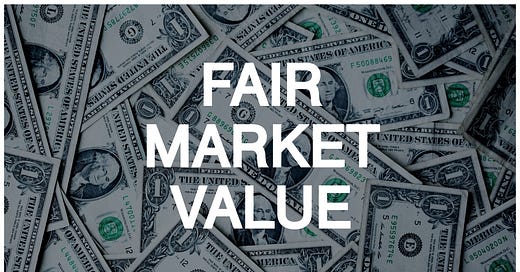Registration is open for the NIL/mba, beginning April 16th. Use the link below to secure a spot today at a $250 early registration discount. The guest faculty for these sessions include: Blake Lawrence (Opendorse), Solly Fulp (Learfield), Darren Heitner (HEITNERLEGAL), Darien Harris (Michigan State University), Spencer Harris (House of Victory / USC Athletics.)
Email me if you have questions or schedule a call with me to discuss the NIL/mba.
What is Fair Market Value in NIL?
When the NCAA allowed student-athletes to profit from their name, image, and likeness (NIL), it tried to preserve control (or what some would say the “the illusion of control”) by adding two rules:
No pay-for-play
NIL compensation must reflect fair market value
The first has always been blurry. The second is equally complicated.
What exactly is fair market value in NIL?
In the context of college athletics and Name, Image, and Likeness deals, "fair market value" (FMV) refers to the price that a student-athlete's NIL rights would command in the open market, ensuring that compensation is legitimate and not a disguised form of recruitment or athletic performance payment.
The market, however, has spoken—and what it’s saying contradicts the NCAA’s intentions.
The Problem with Fair Market Value
Fair market value is supposed to reflect what something is worth under open-market conditions.
But in college sports:
There’s no transparent NIL marketplace
No standard contracts
Almost no oversight
Instead, there are Collectives.
Collectives are making team-wide offers that ignore student-athletes’ performance, personal brand value, or marketability.
Payouts by Collectives aren’t based on output or the results of promotional work done by the athletes. They are based on being on the roster.
That’s not a market. That’s a subsidy.
Why It Matters
If NIL is going to work as it’s intended, we need to ask: What is a student-athlete worth to those funding their NIL deals—based on reach, relevance, and return?
Today, the answer depends less on the athlete’s market value and more on:
The generosity of the school’s Collective
The size of the local donor base
The sport they play
A Texas offensive lineman may get $50,000 from a Collective.
A track star with better performance and more social followers might get nothing.
That might still be an open market - but it feels broken.
The Two NIL Economies
We’re watching two parallel NIL systems form:
1. The Influencer Economy
This reflects the original vision—student-athletes paid based on personal brand value. This could be re-named the “Livvy Dunne Economy”, based on her ability to earn millions through sponsored posts and other business acumen.
In a recent NIL Research Poll survey, only 23% of current college athletes believe their NIL earnings reflect their true market value
This system rewards content, engagement, and visibility. It follows market forces.
2. The Collective Economy
This model pays athletes simply for being on the roster. It doesn’t account for audience, impact, or personal value.
In previous NIL Research Poll surveys, 77-83% of DI student-athletes said their NIL income came from a Collective and not from their own efforts.
In the influencer economy, fair market value exists. In the Collective economy, it’s irrelevant.
What’s the NCAA Supposed to Do?
As part of the House settlement, Deloitte has been selected to operate an NIL fair market value reporting platform. The organization has been tasked with assessing the authenticity and value of NIL deals, preventing inflated deals and ensuring compliance with the new revenue-sharing cap.
Deloitte's role will include:
NIL Fair Market Value Platform: Deloitte will be responsible for the NIL fair market value reporting platform, which will assess the authenticity and value of NIL deals.
Preventing Inflated Deals: The platform aims to prevent schools from using booster-backed Collectives to bypass the revenue-sharing cap by ensuring deals are valued fairly.
Fair Market Value Assessment: Deloitte will determine the fair market value of NIL deals, using a "compensation range" based on previously struck deals.
Deal Verification: The clearinghouse, operated by Deloitte, will verify the authenticity of NIL deals, ensuring they are not based on inflated values or "phony booster-backed compensation agreements".
Appeals Process: If a deal is rejected by Deloitte, there will be an appeals process, allowing athletes to resubmit deals with alterations suggested by the clearinghouse.
Arbitration: If a deal is rejected a second time, it could go to arbitration, and then eventually to the courts.
Subscribe to NIL/edu for $5 per month to unlock the rest of this newsletter, including:
What Can Be Done?
Questions Worth Asking
Final Thought
You’ll get access to this edition, 4 newsletters per month, and all past subscriber-only content.
Keep reading with a 7-day free trial
Subscribe to NIL/edu to keep reading this post and get 7 days of free access to the full post archives.




